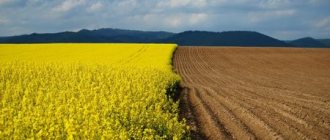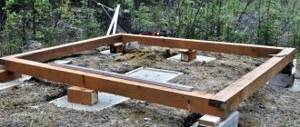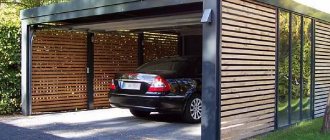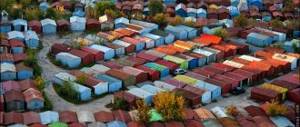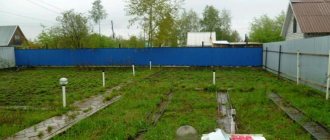Agricultural lands attract citizens with their ecological cleanliness. Therefore, many seek to purchase a country plot for subsequent development. What can be built on such sites?
Advertising slogans of companies that sell land promise that the plots are intended for residential construction. However, when trying to obtain a building permit, citizens are met with refusal. This is due to the fact that agricultural lands are under special state control. Therefore, the procedure for using such lands is regulated by current legislation.
If you look at the Land Code, you may come across very vague wording. For example: “an interested or proper person can engage in construction.” In addition, building a house in agricultural areas is allowed only after agreement with the relevant authorities.
The greatest difficulty will be obtaining permission from the environmental service. You will need to prove that the erected structure will not disturb the environmental situation. Let's figure out what kind of construction on agricultural land is permissible in 2021.
Let's understand the definitions
The entire land fund of Russia is divided into seven categories according to their intended purpose. There are territories allocated for urban development and industrial facilities. Obtaining a building permit is not difficult.
There are lands classified as environmental protection zones. They are not intended for residential construction and are under state protection. The same applies to reserve lands that are temporarily withdrawn from circulation.
Agricultural lands are included in a separate line. These territories are located outside urban areas and are intended for agricultural activities. For misuse or pollution of such lands, administrative and civil liability is imposed.
For 2021, agricultural areas are intended for:
- farming for personal purposes;
- production of agricultural products and plant raw materials;
- farm devices;
- gardening;
- breeding freshwater fish in artificial or natural isolated reservoirs.
As you can see, we are not talking about the construction of a residential building or technical buildings. However, agriculture is impossible without developed infrastructure. Therefore, the construction of cowsheds, chicken coops, warehouses, roads, and the arrangement of hangars for vehicles is allowed.
Usually, the construction of a residential building requires the transfer of an agricultural plot to another category. This involves putting together a rather impressive package and obtaining the appropriate permit from the local municipality.
The outcome of such a decision is very ambiguous: it is equally possible to receive approval and refusal. This begs the question: is it possible to build a house without this paperwork? It turns out that it is possible, subject to certain conditions.
What can be done on these lands?
The activities permitted on the sites depend on the type of use. Summer cottages and garden plots are intended for recreation and growing fruit and berry trees, as well as vegetable crops. That is, you can build a house on them for permanent or seasonal residence, a bathhouse, or plant a garden. Poultry and livestock cannot be kept there. Livestock lands are intended for this purpose.
As far as peasant farming is concerned, it all depends on what types of activities it is registered for. Another feature of such plots is that they cannot be divided.
If you want to use them for living and outdoor recreation, there are two options. The simplest is the organization of a large estate for a family, designed as a farm.
In this case, you will have to conduct at least minimal agricultural activity.
Another method is used if several owners are expected.
A peasant farm is formed with the right of joint ownership, the land is divided by agreement. But it will be impossible to sell such a separate plot, which is part of a larger one. Also, it will not be possible to obtain registration at the peasant farm site.
Areas for personal use
Usually these are agricultural lands included in the territorial formations of garden partnerships and cooperatives. According to current legislation, these plots are reserved for summer cottage construction.
Once again we are faced with vague legal language. What should be understood by country house construction? According to regulations, this definition includes temporary buildings not intended for all-season living. It is very difficult to register in such a building or register it as a real estate property.
In addition, the construction of technical buildings is allowed: sheds, premises for livestock and poultry, greenhouses and sheds. Permits for the construction of the listed facilities are not required.
Please note that the construction of a residential building that falls under the definition of a permanent structure is not permitted. This is considered an inappropriate use of the allocated area.
In addition, the law prohibits engaging in any commercial activity on land allocated for personal farming. To build a house, you will need to change the category of land. It is worth noting that for such areas this is a completely feasible procedure.
Type of permitted use
Based on Law No. 66-FZ, a dacha plot means land provided to a person or acquired by him for the purpose of growing crops and recreation .
Construction on such territory is permitted:
- residential properties with the right to register in them;
- residential properties without the right of registration.
The permitted number of floors for residential buildings is 3 above-ground floors.
Important! When constructing residential buildings on a dacha area, it is not necessary to obtain permission . The dimensions and purpose of buildings under construction are also not regulated, unlike construction projects on individual housing construction lands.
The registration procedure is significantly simplified if the allotment belongs to the category of land in populated areas.
If the category of the plot is agricultural, then the owner may try to change it.
You can do this as follows:
- If the site borders a populated area, the owner must contact the authorized local government body with the initiative to amend the master plan or territorial planning scheme.
- If the site is located at a distance from a populated area, then the owner should contact the regional authorities . A positive decision can be made if there is justification, for example, the creation of a TSN.
Let's consider what risks may arise during construction on agricultural lands allocated for summer cottage construction.
One of the problems will be the fact that it will be possible to obtain registration in a built house remote from a populated area only with the help of a court decision .
When developing this VRI, it was assumed that residential buildings would have a dacha purpose, that is, for seasonal rather than permanent residence. Therefore, in order to register in such a built capital building, it is necessary to prove that you can live inside the house all year round .
The necessary documents will be an expert opinion and a technical passport of the object, which are required to be submitted to the court.
There may be problems with assigning a postal address to a building . It is necessary not only for correspondence, but also for submission to the FMS authorities upon registration.
To obtain a postal address for a house, the owner must contact the local administration.
However, according to the law, assigning a postal address is mandatory only for buildings within the boundaries of a populated area. If the dacha plot is located outside its borders, then the decision to provide a postal address is made at the local level.
Farms
Here the situation looks somewhat different. Agricultural land allocated for organizing farms may be used as follows:
- organization of hunting grounds with breeding of wild animals;
- use of arable and fertile lands for growing crops;
- development of pastures, breeding of poultry and livestock;
- construction of warehouses and other buildings necessary to ensure the functionality of the farm.
Considering that the farmer himself also needs to live somewhere, the last point directly indicates that it is possible to build a house on an agricultural plot. If you follow the letter of the law, such permission is given by Article No. 263 of the Civil Code of the Russian Federation and provisions 40, 43 of the Land Code.
However, there are some limitations. In particular, the construction of a residential building no higher than 3 floors is allowed. But the building can be officially registered, with the assignment of an address and registration for the owner.
What land can be used for summer cottage construction?
This possibility depends on the permitted use of the land. If there are several of them, the types are divided into:
- basic;
- auxiliary;
- conditionally permitted.
Of the main ones, the owner can choose any (or any) at his discretion. Auxiliary types can be used only if activities are carried out on one of the main ones.
And for those with conditional permits, you will have to obtain additional permission.
That is, you can build if one of the main VRI allows it. Or in the case when construction is permitted for auxiliary purposes, but activities are also carried out for the main purpose.
Agricultural land
This definition includes agricultural plots allocated for cultivating land and producing plant materials. Is it possible to build on this territory?
The law allows the construction of non-permanent buildings for economic purposes. This includes hangars, warehouses, production workshops that do not conflict with the intended use of the land.
Such structures do not require a building permit with subsequent registration. If you plan a major residential building, a building permit is required. In this situation, agricultural land is subject to development subject to certain norms and requirements.
Risks during construction on agricultural (agricultural) lands
The idea of building a house or cottage on agricultural land is always tempting. However, there are many risks involved.
Firstly, the owner may have problems with the postal address. If the house is located outside the border of a village or city, then the local administration will not be able to assign an address to it. This issue will have to be resolved at the regional government level.
Secondly, if the house was not built on a summer cottage, but on arable land, a garden plot or other lands with a land plot that does not allow the construction of permanent structures, then the state can apply the following sanctions:
- Issue a decree to demolish the building;
- Impose a fine for illegal construction.
As we see, the risks of unauthorized construction on agricultural land are quite high. In fairness, it is worth noting that any decision can be appealed in court.
Can it be used for farming?
Categories of land are established and enshrined in legislation in the first chapter of the Land Code , in Articles 7 and 8 of the Land Code of the Russian Federation. According to the provisions of Article 42 of the Land Code of the Russian Federation, they can only be used in accordance with the established category. Accordingly, plots from among the agricultural lands can be used for dacha farming, but only on the condition that they relate to the corresponding intended purpose and are intended for dacha farming (about what can and cannot be done on agricultural lands, as well as about the characteristics such areas, we wrote in our material).
The conditions are specified in Federal laws:
- dated April 15, 1998 No. 66-FZ;
- dated 07.2017 N 217-FZ.
In addition, a dacha and gardening enterprise is a legal entity , which is the founder who has purchased or leased from the administration land tracts located outside the city limits:
- in the location of rural settlements;
- in an uninhabited area.
The following types of activities are allowed here:
- gardening;
- planting a vegetable garden;
- dacha developments on the site.
Reference. The construction of a house on such sites is not a prerequisite. The main thing is soil cultivation and the presence of cultural plantings.
We wrote here about how to organize SNT on agricultural lands and what can be built on such plots.
